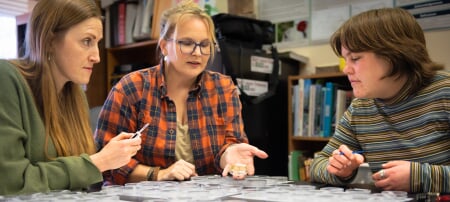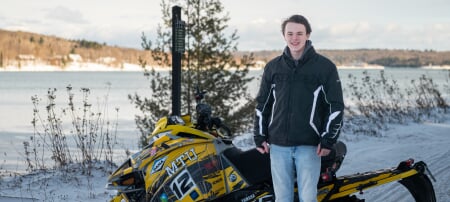Minerick to Present at NAE Symposium on Engineering Education
Adrienne Minerick has developed a new, split-level course that teaches students how to navigate the rocky road of research and real-world problem-solving. She will soon be telling her peers about it at the Frontiers of Engineering Education Symposium, hosted by the National Academy of Engineering.
Minerick, an associate professor of chemical engineering, admits that the name of her talk is somewhat unwieldy: “Student-Driven Learning through Subject Contextualized Concept Development Projects.”
“It’s too many words,” she says. “And it can be hard to describe, but when I do describe it, people love it,” which explains why she’ll be at the NAE symposium, set for Oct. 27-30 at the University of California, Irvine.
She applies the teaching technique in her Analytical Microdevice Technology course, in which undergraduate and graduate students develop handheld, “lab-on-a-chip” technologies. The class begins with students selecting a project theme with Minerick’s guidance. “I seed the initial discussions with a variety of concepts that are relevant to their life experiences and global social ethics,” she says. Last year, one team worked on water quality. Another, including a three-time cancer survivor, focused on a device that screens cancer cells and uses the information to personalize treatments for each individual patient.
As students work on their projects, they run into roadblocks. “I teach them how to find answers in the literature, a problem-solving strategy that is essential, not only for grad students, but also for undergrads aiming to distinguish themselves and advance their careers after they graduate,” she said. “And whenever I notice that they need background, I prepare a lecture on that topic, making the lectures driven by the content students need to complete their projects.”
It’s harder for the instructor than a traditional lecture. “It’s more work; you can’t prepare in advance,” Minerick said. “You have to do it just-in-time.”
In addition, it’s an unfamiliar classroom format for undergraduates. Until taking Analytical Microdevice Technology, most of their labs have involved tried-and-true experiments. This course is all about uncertainty. “A wise student of mine once said, ‘Expect things may fail in research, because otherwise, it would just be called search,’ and that is so true,” said Minerick. “This class is often the first time they realize that an answer is not known, that there isn’t one correct answer, and that the optimal solution becomes apparent after a few stumbles.”
She is aware that the class is demanding and has lightened it up with an in-class game based on “The Survivor.” But it is still serious stuff. Students are expected to write a final report worthy of publication in a peer-reviewed journal.
“Our K-12 educational system, in addition to parts of college, generally teaches our students to think in black and white, right and wrong. Thus, when a task or research project isn’t turning out as expected, students often conclude the experiment didn’t work and they stop thinking. As I advise students, I always ask them to show me the data, and we talk about what caused the result and what it means,” she said. “Nobody wants to show off their failures, but discussion, especially in a team, can be enlightening, because team members each have different perspectives. Frequently, results that a single inexperienced student couldn’t interpret have valuable meaning.”
Those missteps can be powerful teachers. “There are times when a team will turn in a poorly thought-out, randomly pieced together series of disparate concepts where they have not made the logical connections or carefully reasoned through inconsistencies. I provide detailed feedback and direct the teams to specific sources from which to learn and correct the inconsistencies. Almost all of the teams regroup and come back with a much higher quality product,” said Minerick. “It’s an unfamiliar process, but the students usually rise to the occasion and do an outstanding job.”
Ongoing assessments of the students who have completed the course have revealed continued enthusiasm for ongoing reading and learning on the topic and use of the problem-solving skills.
Michigan Technological University is an R1 public research university founded in 1885 in Houghton, and is home to nearly 7,500 students from more than 60 countries around the world. Consistently ranked among the best universities in the country for return on investment, Michigan's flagship technological university offers more than 185 undergraduate and graduate degree programs in science and technology, engineering, computing, forestry, business, health professions, humanities, mathematics, social sciences, and the arts. The rural campus is situated just miles from Lake Superior in Michigan's Upper Peninsula, offering year-round opportunities for outdoor adventure.




Comments